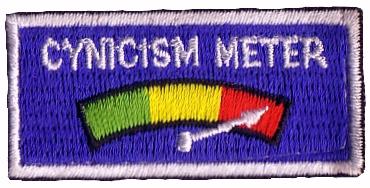A place to listen to an odd individual who doesn't fit in within his own minorities.
Wednesday, September 17, 2014
Properly Using and Understanding Cynicism
I frequently hear day to day that cynicism is a destructive thought behavior. While at times I am led to believe this is true, I still cling to my thought process. This has led me to look deeper into the issue for I do not believe that I am a fatalist, so their must be a reason that benefits me that I retain my cynicism.
I began my search by starting with the people who were giving me the advice to be more optimistic especially in regards to trusting others. Quickly I realized the cause of many of their beliefs stemmed from one of three causes:
The first was that the person was simply naive. This was admittedly quite rare, but when applicable, I just took the advice for the grain of salt it was worth and moved on.
The second was that the person did not really experience extreme shifts and problems in their life that would warrant more of a grim outlook on the world. When dealing with this person, it is important to note that just because their experiences of life are different does not mean there is nothing to gain from their council. Being optimistic does have its merits and there is a time for joy. It is finding that balance that is key, and the advice given by this person is a step towards that goal for the hunkered down cynic.
The third group is in my opinion the most important for they can empathize with a cynic mired down in their beliefs. This third type is a former cynic that has found optimism where they thought there would be none. This person in most cases has the most to share as they have experienced life in a way close to the cynic seeking advice. I have found that this type of individual is normally the person a cynic envisions of themselves. Not optimistic to the point where it borders on stupid but also happy enough with the world and trusting of their fellow man to the point where a fulfilling life is very possible and probably a daily occurrence.
Taking what I have learned from these three types of people, I still had some doubts about why I was a cynic and was still inclined to believe that I just had trust issues and the behaviors were still quite destructive in my life. Still I refused to give up on the answer, so I decided to look inward instead and really understand what being a cynic means and after much trial and error, came up with the positive traits of cynicism.
Surprisingly, there are quite a few benefits to being a cynic I found. Willing to question everything, practice more, and really putting in an effort to understand people were just a few of the benefits I found. Of course I also discovered that letting negativity weigh you down is quite destructive and clearly as both the second and third groups of optimists showed me, you have to find the balance. That does not just mean being more optimistic, it also refers to how to properly use cynicism.
Questioning everything is a hallmark of both science and Judaism as well as a cornerstone of our entire society, being optimistic does not lead to the change that these powerful forces can bring. To be a Cynic is to dream, to not be content with what you have. Dreams create new realities.
As far as knowing when you have let the cynic inside overwhelm, once you have decided that the dreams you anticipate have become impossible, it is time to edge a little more towards optimism
Subscribe to:
Post Comments (Atom)

No comments:
Post a Comment